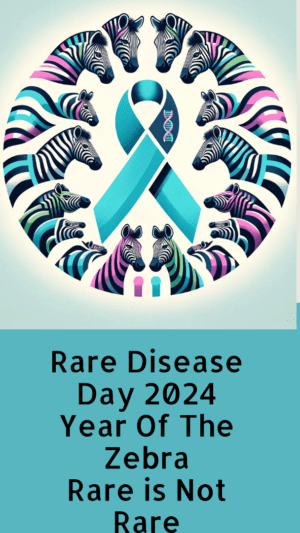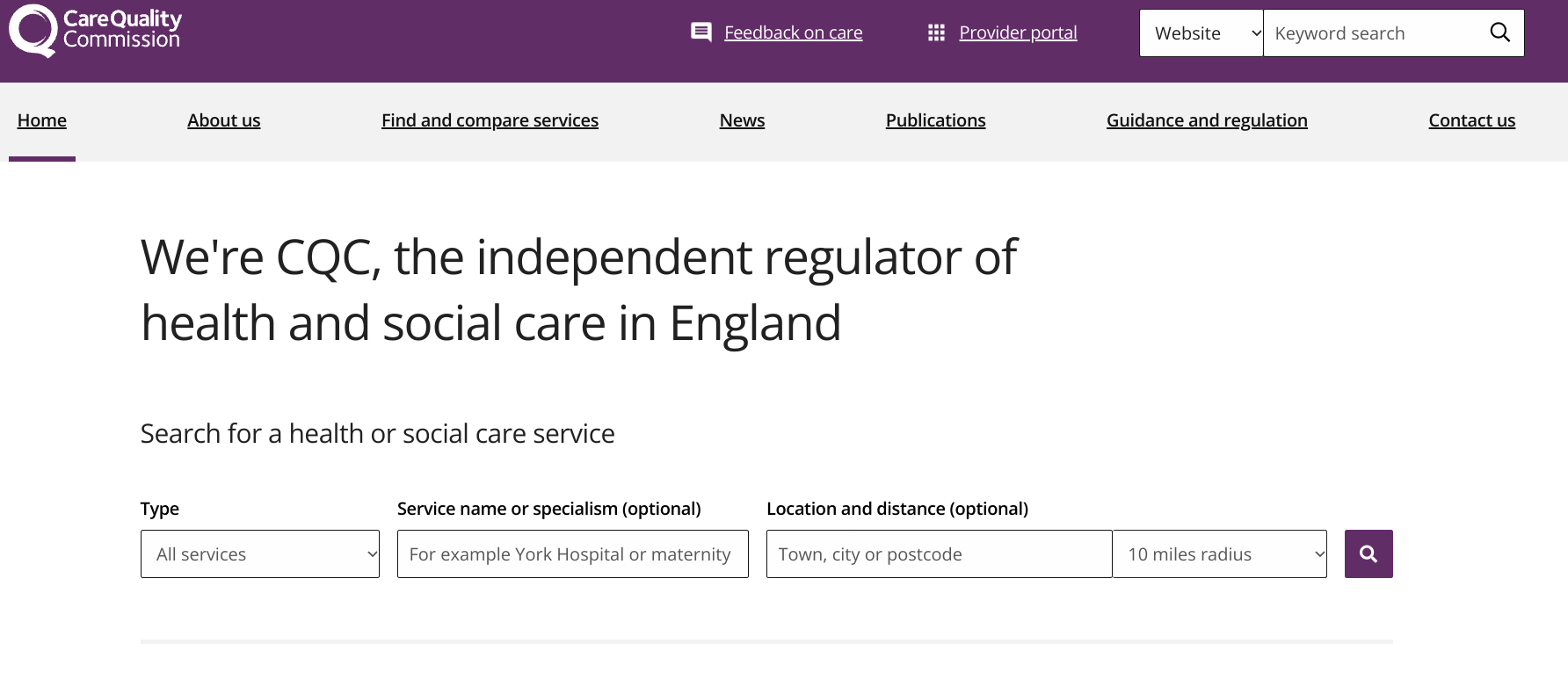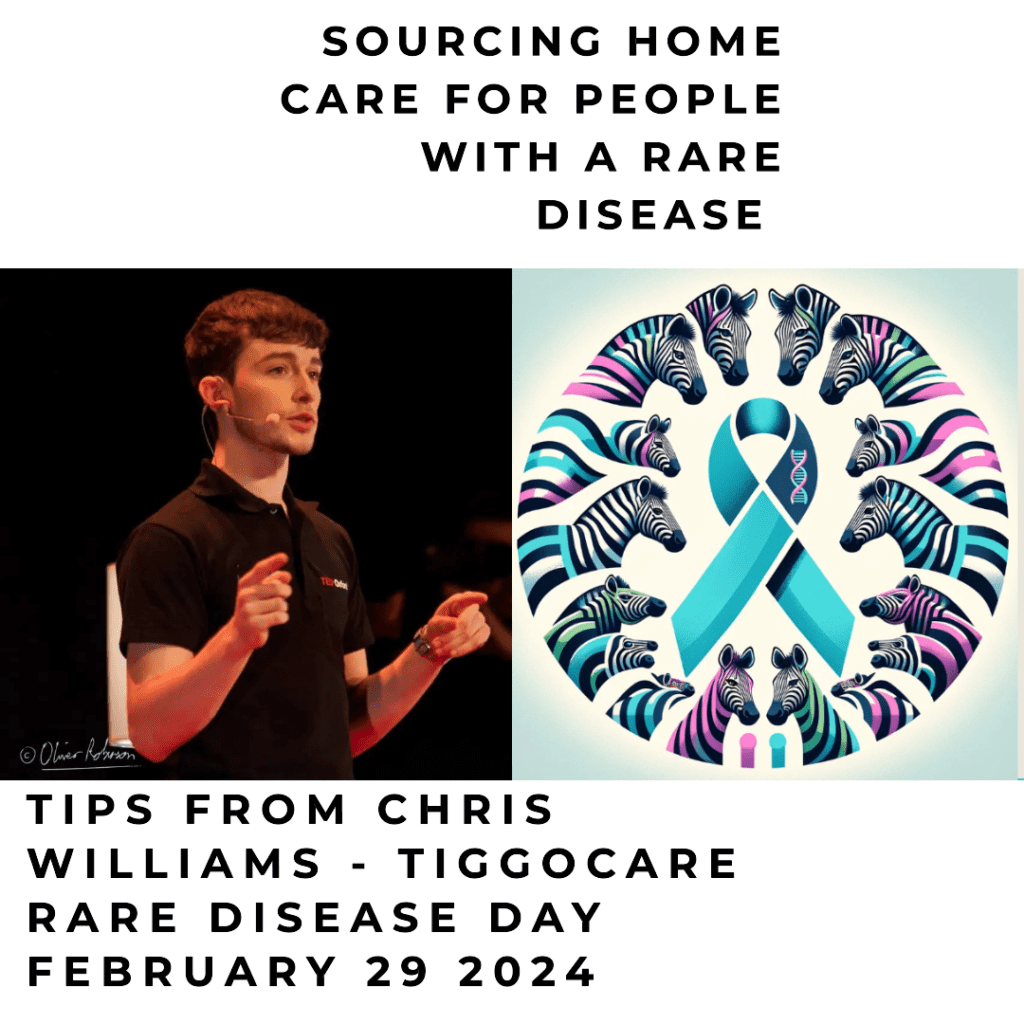Rare Disease Day 2024 is on 29 February, to take part this year we have asked Chris Williams to write a post for us:
Chris Williams is the Managing Director of Tiggo Care, an award-winning home care business supporting adults living in London. He has a BA in Human Sciences from Oxford University and an MSc in Epidemiology from Oxford University.

Rare diseases have been a part of my life ever since I was born. Growing up, both of my parents were seriously ill with long-term conditions. My father lived with a rare kidney disease called Berger’s syndrome and my mother, who was his primary carer, developed trigeminal neuralgia in the final years of his life.
I started Tiggo Care, an award-winning home care business because I found it difficult to source care for my mother. I discovered that many care organisations are not set up to cater for people with a rare disease and intermittent needs.
In recognition of Rare Disease Day I’m going to share some general information about rare diseases and also some practical tips for any readers who are looking to source home care for a loved one with a rare disease.
What is a rare disease?
According to British and European definitions, a rare disease affects fewer than one in 2,000 people. While certain rare diseases, such as Duchenne muscular dystrophy, cystic fibrosis and sickle cell disease, are widely known, others may affect only a few people and remain largely unknown. Some diseases are exceptionally rare, to the extent that only one or two people in the UK have the disease at one time.
How many rare diseases are there?
There are between 5,000 and 8,000 known rare diseases, although new conditions are still being discovered. Every year 6,000 children are born in the UK with a condition so rare that it doesn’t have a name so it is likely many more rare diseases exist.
How common are rare diseases?
Although rare diseases are individually rare, collectively many people live with a rare disease in the UK. One in 17 people will develop a rare disease during their lifetime. This equates to around 3.5 million in the UK and 30 million people in Europe.

Prevalence at a global level is lower and recent estimates suggest that 4% of the global population live with a rare disease. This is the equivalent of 300 million people.
What causes rare diseases? Are all rare diseases genetic?
8 in 10 rare diseases have a genetic origin but environmental factors can also cause rare diseases. For example, some rare diseases are caused by:
- Diet or chemical exposure
- Infections
- Injuries or trauma
- Other health conditions, such as high blood pressure
In many cases, the exact cause of the disease is unknown because there has been insufficient research into the determinants of the disease.
Top Tips For Sourcing Home Care Assistance
Because rare diseases are so uncommon, it can be hard to find support. Even if you’re only looking for some emotional or practical support, you may struggle to find help.
The more well-known conditions all have big support groups and charities dedicated to giving people tailored advice. Support groups for rare diseases are unlikely to have anywhere near as much funding as the likes of Cancer Research UK and for many rare diseases there are no support groups at all.
Nonetheless, it is still possible to find a good home care assistant to support your loved one with a rare disease and I’ve compiled a list of 5 tips that I wish I had known when I began sourcing care for my mother.
Tip 1: Identify Their Needs Before Asking For An Assessment
All care companies and social care companies aspire to provide person-centred care but it’s also true that people with similar health conditions have similar needs. When your loved one has a rare disease the care provider is unlikely to have any understanding of their needs before the initial assessment. If you and your loved one can determine their needs before organising an assessment you’ll find the assessment will be more productive and ultimately the care package will get off to a much better start.
When assessing your loved one’s needs consider the following:
- Does your loved one need help with personal care? Personal care includes bathing, hair washing, teeth brushing, getting dressed etc.
- Can your loved one manage their medications?
- How does your loved one prepare their meals and could they benefit from any extra support in the kitchen?
- Does your loved one need assistance moving around their home or getting to appointments in the community? Does your loved one have any equipment to assist them with their mobility?
- Do they need help keeping their home clean and tidy?
- Does your loved one have any communication needs?
- What goals does your loved one want to achieve and how do they hope to benefit from the extra support?
If you know the answers to these questions before the assessment it will be much easier for potential care companies to assess your needs and for the care package to be a success.
Tip 2: Check Their CQC Rating

When evaluating the suitability of local care companies you should check their Care Quality Commission (CQC) rating. The CQC grades care providers across 5 Key Lines of Enquiry:
- Safe
- Effective
- Caring
- Responsive
- Well-led
Each of these Key Lines of Enquiry is graded as either Requires Improvement, Inadequate, Good or Outstanding. The CQC also provide an overall rating using the same scoring system. All care companies are required to share their overall CQC rating on their company website.
I would strongly recommend you check each company’s rating on the CQC website instead because then you can see if the care company has scored particularly well or particularly poorly in one or more of the Key Lines of Enquiry. Less than 5% of care providers receive an overall rating of Outstanding so I would recommend your minimum criteria is a Good rating across all five of the Key Lines of Enquiry.
When it comes to sourcing care for someone with a rare disease I would pay particular attention to the Responsive Key Line of Enquiry because a good score here will indicate that the company is flexible and can quickly adapt to the needs of clients with less common needs.
Tip 3: Check The Contract
Minimum Requirements
All care companies have minimum durations for an individual care visit and for the number of care visits received each week. For example, at Tiggo Care our minimum requirement is a singular 2-hour visit each week. For clients receiving more than 10 hours of care per week our minimum duration for a single visit decreases.
For some people, 2 hours or even 1 hour for an individual visit might be too long. Maybe your loved one only needs someone to pop by for 15 minutes to assist them with their medications. That’s fine but not all care companies can offer shorter visits. Hence, it’s important to have a good understanding of their requirements before you start organising consultations.
Notice Periods
Care companies invest a lot of money onboarding new clients and so most have minimum notice periods ranging from 28 days to 3 months depending on the type of service you receive. For those with rare diseases, I would recommend negotiating a shorter trial period so you and your loved one can determine if the care provider can meet their needs before locking into a service for 3 months.
Hidden Fees
Finally, make sure you ask for a breakdown of all hourly rates and fees before signing a contract. Some care companies charge different rates for care visits at different times of the day and others have additional charges for mileage, assessments and PPE.
Tip 4: Ask About Continuity of Care
Continuity of care, as it is known in the industry, refers both to the number of carers in a person’s care package and the extent to which the same carers visit each week. Research has shown continuity of care greatly improves the quality of a service and it helps carers to get a better understanding of their client’s needs, which is particularly important when supporting someone with a disease they’ve not come across before.
During the first consultation with a care provider ask them how many carers will be involved in the package and if the same carers will attend each week. They will likely say that there will be times when carers take planned or unplanned leave and that on those occasions someone new might have to cover, but otherwise, you should expect the same team to visit on a weekly or fortnightly rotation. If the care company says something different I would recommend you keep looking.
Tip 5: Ask What Happens If You Want A Different Carer
When a care provider assesses someone’s needs they should also be assessing which of the carers on their roster have a complimentary personality for your loved one. Carers often become great companions for the people they support and this companionship can greatly improve your loved one’s experience.
However, sometimes a care provider might match your loved one with someone who isn’t quite right. Ask your care provider what will happen if your loved one doesn’t get on with their carer. Are they able to try someone new or are they stuck with that person until the end of the month?
What other types of support are available for people with a rare disease?
Home care and live-in care are great options for many people living with a rare disease, but some people, especially those with more complex needs, might benefit from a different type of care service. Other options to consider include:
- Private Home Carers – I’ve written another blog post about the pros and cons of private carers here.
- Assisted Living – This is where you live in a self-contained flat which you are not responsible for and carers are available for up to 24 hours per day.
- Supported Living – This is where you live in a home which you are responsible for and carers are available for up to 24 hours per day
- Care Home – This is where you live in accommodation with other people where carers are available to support you 24 hours per day 7 days a week.
Conclusion and Tips Summary
| Tip Number | Strategy | Explanation |
|---|---|---|
| Tip 1 | Identify Needs Before Assessment | Determine your loved one’s needs to make the assessment more productive and the care package more successful. |
| Tip 2 | Check the CQC Rating | Evaluate local care providers based on their Care Quality Commission (CQC) ratings to ensure quality service. |
| Tip 3 | Understand the Care Contract | Familiarise yourself with the care provider’s contract, including minimum visit durations, notice periods, and any hidden fees. |
| Tip 4 | Inquire About Continuity of Care | Ask how many carers will be involved and the consistency of carer visits to ensure personalised and effective care. |
| Tip 5 | Option to Change Carers | Understand the process for requesting a change if the assigned carer is not a good match for your loved one. |
Sourcing appropriate home care for a loved one with a rare disease can be challenging, but by following these tips you are much more likely to find a care provider that can meet your loved one’s needs. Remember, while the journey may be daunting, informed decisions and proactive communication can make all the difference in providing the best care possible.
And Finally: Why was the Zebra Chosen as a symbol of Rare Disease Day?
Zebras are used as the symbol for rare diseases and Rare Disease Day for a few key reasons:
1. Zebras are rare animals, just like rare diseases are uncommon conditions. The “zebra” metaphor originated from Dr. Theodore Woodward’s advice to medical students to “think horses, not zebras” when diagnosing patients – i.e. suspect common diseases first, not rare ones. Rare disease advocates flipped this narrative to encourage awareness of rare diseases as real illnesses that need recognition.
2. A zebra’s distinctive black and white striped pattern makes it unique, just as every rare disease is unique. Wearing striped clothing and accessories has become a way for people to visually “show their stripes” in solidarity on Rare Disease Day.
3. Zebras are fierce, resilient animals that stand out from the crowd, similar to how rare disease patients and families demonstrate strength and perseverance in the face of challenges in getting proper diagnosis, care, and treatment.
4. There is power in having a memorable icon that brings the rare disease community together. The zebra gives rare diseases and Rare Disease Day a bold, eye-catching brand for raising awareness globally.
The zebra represents thinking differently about illnesses that are not common, embracing unique identities, showing strength even when standing alone, and uniting behind a symbolic mascot to advocate for change. That is why rare disease organizations have rallied around the zebra to spotlight critical issues on Rare Disease Day and year-round.

